Lessons of Poker

Poker is a game that requires a combination of skills to play well. It’s a game of chance, but it also relies on the ability to read your opponents and make decisions under uncertainty. It’s a great way to learn how to think critically and to improve your math skills.
The first step is learning the rules of the game. Then, you’ll want to familiarize yourself with the betting process. Each player must put in a certain amount of chips into the pot before they see their cards. Then, they can choose to call the bet, raise it, or drop (fold).
While there are many different variations of poker, they all have a similar structure. Each round begins with two players putting in their money before they see their hands. Then, the dealer deals five cards face up on the table and places a flop in the center of the table. This creates a betting window where players can place bets on the type of hand they have.
During the next stage, called the turn, an additional card is revealed to the table and the betting window opens again. Then, during the final stage, known as the river, a fifth community card is placed and the betting window closes. The player with the best poker hand wins the pot.
One of the most important lessons of poker is learning how to read your opponents. This includes understanding their body language and facial expressions. It’s also important to watch for tells, which are hints that the player is holding an unbeatable hand. A player’s tells can include fiddling with their chips or a ring, how fast they talk, and how they move around the table.
Another thing that poker teaches is how to control your emotions. It’s easy for anger and stress levels to rise at the table, and if they get out of control it can lead to bad decisions and even financial ruin. It’s important to have a clear reason for any decision you make, especially if it deviates from your regular strategy.
The other lesson that poker teaches is how to calculate odds and probabilities. This is particularly helpful when deciding whether or not to raise or fold a hand. It’s essential to understand how your opponent’s odds of winning are based on the strength of their cards and the number of other players who have raised before you.
The more you play poker, the better you will become. You will develop a strong intuition for frequencies and EV estimation, and you’ll start to think in terms of combos and blockers naturally. Unlike other gambling games, such as blackjack, poker involves more skill than luck, so the more you practice, the better you’ll become. In addition to improving your poker skills, you’ll also be able to apply these lessons in other areas of life. You can apply these skills to your job, finances, and even your relationships!